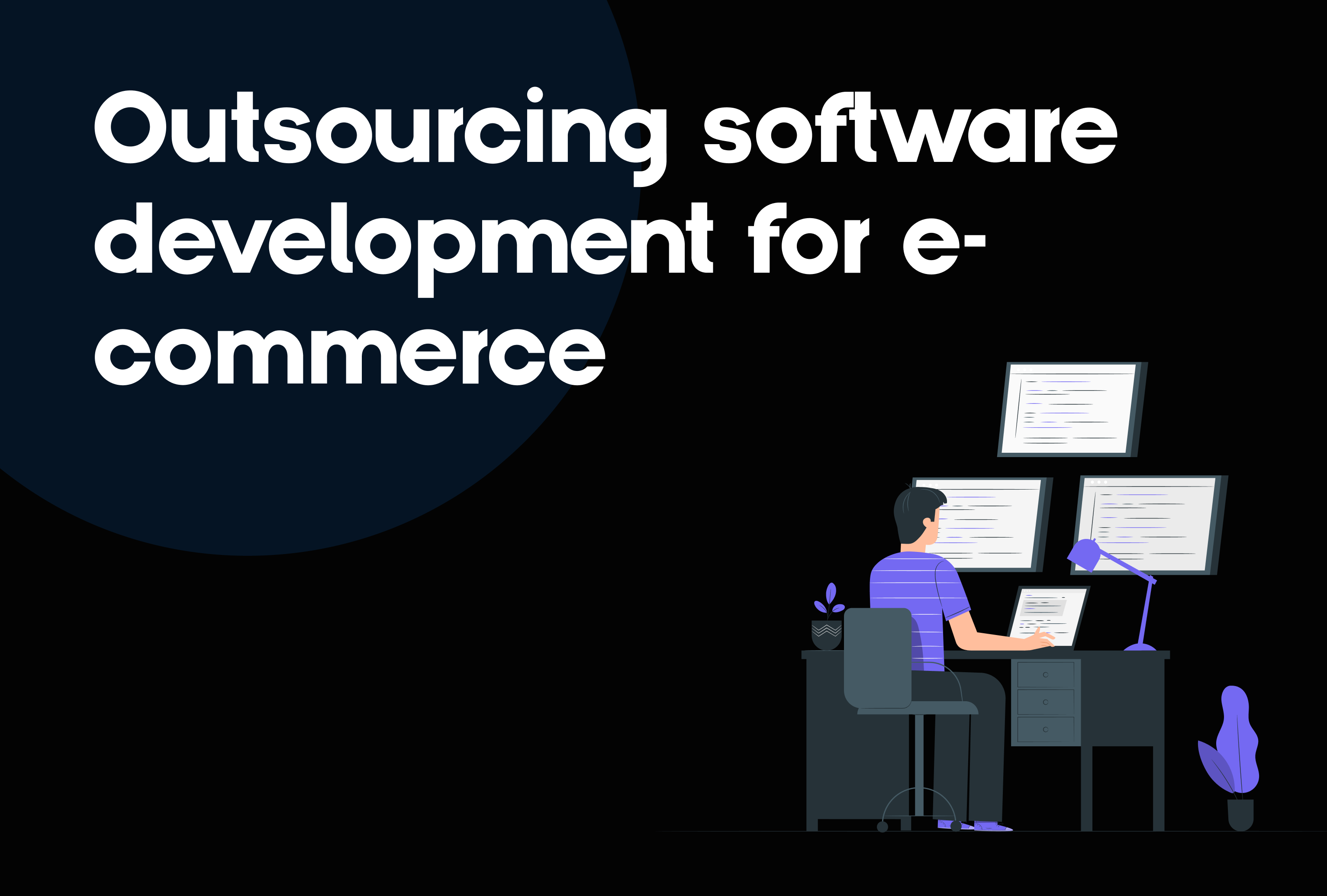E-commerce sales are on track to hit $8.1 trillion by 2026. In order to succeed, online merchants need to deliver engaging user experiences, secure transactions, and advanced functionalities powered by AI-driven solutions. To achieve that without overextending and investing into internal teams, businesses turn to outsourcing e-commerce software development.
Let’s explore how to choose an outsourcing partner that aligns with your e-commerce needs, budget, and business objectives, and why Ukraine has become a hub for tech outsourcing. We’ll also prove that bART Solutions stands out among the top software development outsourcing firms for companies seeking custom solutions for SMBs.
Why Outsource E-Commerce Software Development?
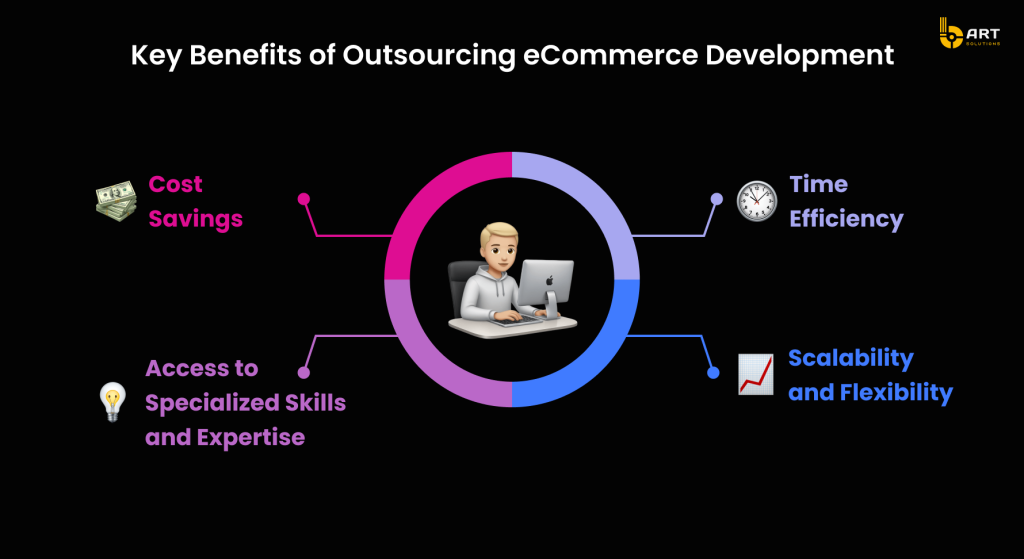
Accelerated time-to-market
A Deloitte survey found that 62% of e-commerce businesses accelerated feature rollouts by outsourcing development. By tapping into teams with domain expertise, companies streamline workflows, avoid bottlenecks, and reduce the trial-and-error phase. Experienced outsourcing development partners, like bART Solutions follow agile methodologies, best QA practices, and continuous integration process, ensuring that new features go live faster and at top quality.
Specialized skill sets
Modern e-commerce development demands expertise across multiple disciplines. Outsourcing allows to tap into cross-functional teams that include software engineers, data analytics, cybersecurity specialists, and UX/UI designers. All of them bring specific skills for e-commerce technology scaling. This isn’t just about code, it’s architecting future-proof solutions, optimizing performance for high-traffic events, and ensuring integrations with third-party platforms like payment gateways, logistics providers, and AI-driven customer service tools.
For companies looking to accelerate outsourcing e-commerce app development, working with an experienced partner means skipping the costly and time-consuming process of building an in-house team. Instead, businesses gain immediate access to a highly skilled talent pool, equipped with the latest technologies and best practices for custom e-commerce software development, ensuring faster implementation and strong competitive advantage.
Cost efficiencies
One of the main benefits of e-commerce software outsourcing hinges on labor cost differences. In high-cost regions like the U.S. or Western Europe, custom software development rates can range from $100 to $200 per developer hour. While Ukrainian developers with comparable skill sets usually charge $50 to $80 per hour. For a complex, long-term project, this difference can translate into tens or even hundreds of thousands of dollars in savings.
As an example, implementing a mid-scale AI-driven e-commerce solution might cost between $80,000 and $120,000 in the U.S. but closer to $40,000-$60,000 in Ukraine with the same (or higher) level of technical expertise.
Understanding business needs
A clear grasp of strategic objectives of your business is fundamental before engaging in outsourcing software development. Are you looking to expand internationally, reduce bounce rates via improved site performance, or launch niche products with customized checkout flows? Each goal needs different e-commerce development solutions, from AI tools that predict buyer behavior to multi-currency payment integrations.
Identifying must-have features
A successful e-commerce platform development requires more than just an attractive storefront. When considering outsourcing software development, decision-makers should identify the core features they need to differentiate from competitors.
Payment systems & checkout optimization
A Baymard Institute study found that 70% of online shoppers abandon their carts, with unexpected costs, complicated checkout steps, and lack of payment options being key reasons. To avoid this, an e-commerce platform must support:
- Multiple payment gateways: Seamless integration with PayPal, Stripe, Apple Pay, Google Pay, and regional payment solutions.
- One-click checkout: Features like Amazon’s one-click purchasing improve conversion rates.
- Buy Now, Pay Later (BNPL): Integrations with Klarna or Afterpay to attract budget-conscious shoppers.
- Strong security & compliance: Protect customer transactions with fraud detection tools, tokenization, and two-factor authentication (2FA).
Inventory & order management
Real-time inventory tracking is essential for preventing overselling or stock shortages, while automated systems can streamline warehouse operations. Key features include:
- Multi-warehouse support: Manage inventory across multiple locations with dynamic stock updates.
- Automated stock replenishment: AI-driven demand forecasting can reduce stockouts by up to 30%.
- Seamless ERP & supply chain integration: Sync inventory with Microsoft Dynamics to optimize fulfillment.
- Returns & refund automation: An easy return process increases customer trust and loyalty.
AI-driven personalization
Adobe reports that 80% of customers are more likely to purchase from brands that provide tailored experiences. AI-powered solutions can enhance customer interactions through:
- Personalized product recommendations: Machine learning models analyze browsing and purchase behavior to suggest relevant items, increasing average order value.
- AI chatbots: Reduce support response times and improve customer satisfaction with
- User behavior tracking: Create personalized marketing campaigns based on their location, past purchases, and browsing history.
Mobile-first & omnichannel experience
With 73% of e-commerce transactions happening on mobile devices, a mobile-optimized, omnichannel experience is essential. Key features include:
- Progressive Web Apps (PWA): Provide an app-like experience without requiring downloads.
- Cross-device cart syncing: Allow users to switch between devices without losing cart data.
Cloud-based infrastructure
For high-growth businesses, scaling e-commerce software development is crucial. Cloud-based e-commerce solutions enable:
- Auto-scaling to handle traffic spikes: Essential for Black Friday, flash sales, and seasonal promotions.
- Microservices architecture: Reduce downtime and improve performance.
- Multi-tenant SaaS features: Ideal for marketplace-style platforms hosting multiple sellers.
Contact bART Solutions today to discuss your project in detail.
Take a look at an e-commerce platform we developed.
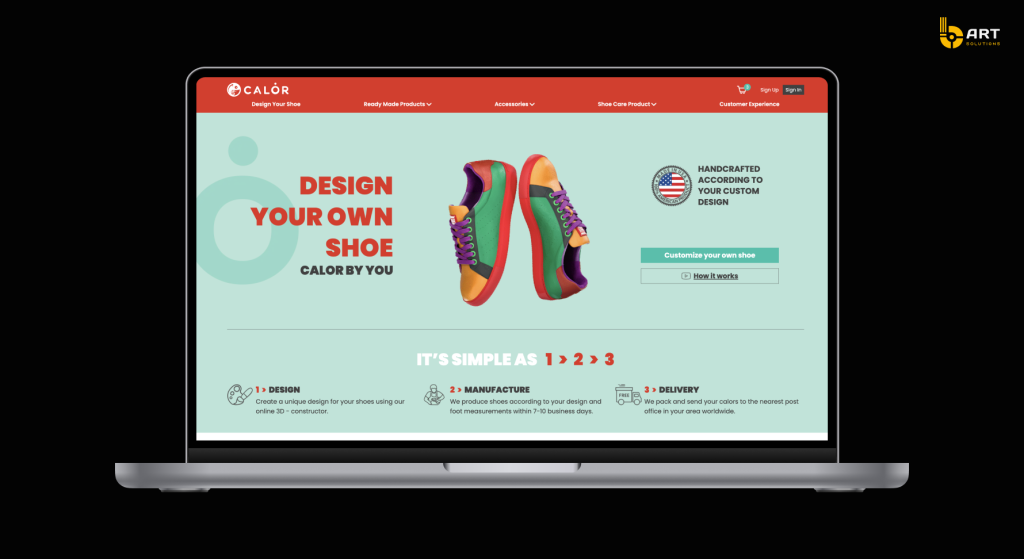
Comparing outsourcing models
Selecting the right outsourcing model is the key decision when choosing to outsource e-commerce software development. The choice between offshoring, nearshoring, and onshoring affects cost, time zone overlap, communication efficiency, and operational flexibility. Each model has its own challenges and advantages depending on your business needs, budget, and long-term goals.
Which model is right for you?
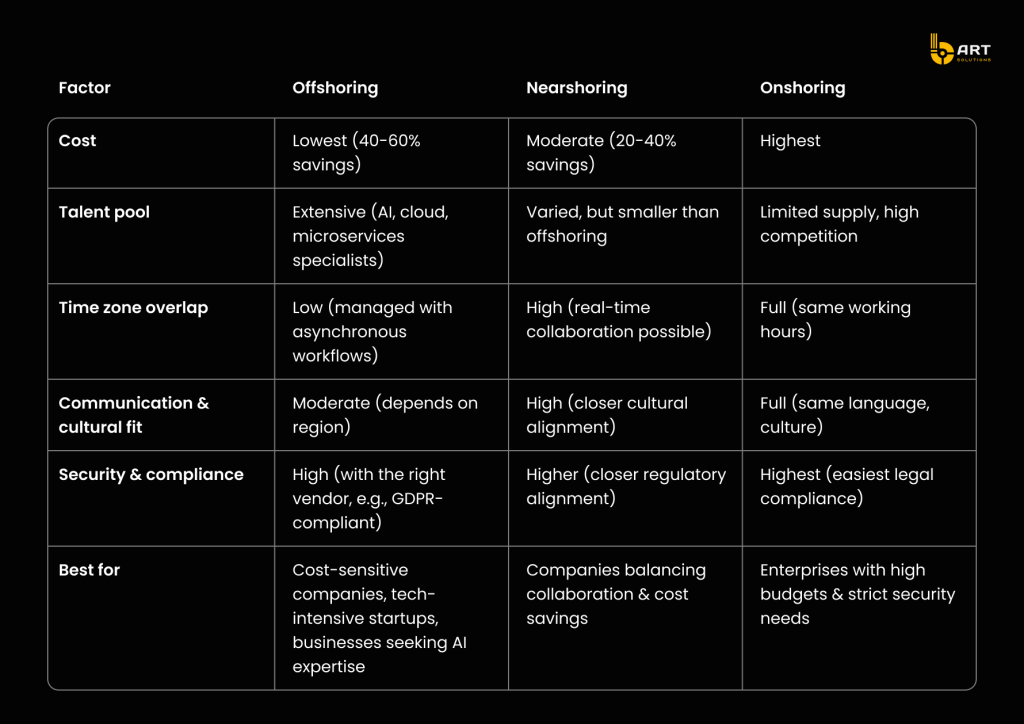
Evaluating vendor expertise
Not all providers are created equal when it comes to best practices in e-commerce software outsourcing. Complex features like real-time product recommendations or advanced fraud detection demand deep domain knowledge and a strong track record. Look for partners that have successfully handled custom e-commerce solutions for SMBs or large online stores, have integrated AI modules, and managed large product catalogs. Resources like Clutch can be very helpful during the evaluation.
Technical skillsets and technologies
An effective e-commerce software outsourcing team should offer a blend of platform expertise, AI integration skills, cloud scalability solutions, and cybersecurity knowledge.
1. Expertise in leading e-commerce platforms
Each e-commerce platform development approach has its strengths and is best suited for different business models.
- Shopify – Ideal for fast-growing businesses, Shopify powers over 4.4 million stores. It offers a large ecosystem, but customization is limited compared to open-source platforms.
- Magento – A robust, scalable open-source platform used by global brands like Nike and Coca-Cola. Magento is known for its advanced customization, AI-driven product recommendations, and multi-store capabilities, making it ideal for companies prioritizing e-commerce development for growth.
- WooCommerce – A popular, WordPress-based e-commerce solution used by over 6.5 million sites . Best for SMBs and content-rich stores.
- BigCommerce – A cloud-based e-commerce platform offering built-in SEO, scalability, and B2B-friendly features.
2. Advanced technologies shaping e-commerce
A strong outsourcing software development partner should have technical depth in modern tools and frameworks to ensure scalability, performance, and personalization.
AI for hyper personalization
72% of e-commerce leaders report increased sales from AI-driven personalization. Essential AI applications include:
- AI-powered recommendations – Amazon generates 35% of its sales through AI-based product suggestions.
- Vendors must know how to integrate collaborative filtering, NLP, and deep learning models for smarter cross-selling and upselling.
- Virtual assistants – Reducing customer service costs by 30%, AI-powered assistants handle inquiries, order tracking, and real-time product searches. Developers should be skilled in NLP frameworks like TensorFlow.
Cloud-based e-commerce solutions
Scalability is a top priority in e-commerce technology scaling, with peak sales periods like Black Friday driving traffic spikes of 300–500%.
Cloud-native architectures enable automatic scaling, faster deployments, and cost-efficient infrastructure management. Key skills include:
- AWS, Google Cloud, or Azure Integration – Developers must be able to deploy, manage, and optimize cloud resources to handle traffic surges.
- Serverless computing – Enables cost-effective scalability, reducing infrastructure costs by 30–50% compared to traditional hosting.
Microservices architecture for scalability
Monolithic platforms struggle with performance bottlenecks as businesses grow. Microservices architecture breaks down e-commerce platforms into independent services (e.g., checkout, inventory, payments), making scaling easier. Businesses should look for teams with expertise in:
- API-first & headless development – Enables front-end flexibility for multi-platform shopping (web, mobile, in-store).
- GraphQL & RESTful APIs – Streamlines data fetching for faster, more efficient site performance.
- Containerization – Ensures each microservice runs independently for easier maintenance and scalability.
Security & compliance expertise
Cybersecurity breaches can be costly. Choosing an outsourcing partner for e-commerce means ensuring their knowledge of:
- PCI DSS compliance – Essential for securing credit card transactions.
- GDPR & CCPA data privacy – Required for handling customer data in the EU and California.
- Fraud prevention & encryption – AI-powered fraud detection systems prevent unauthorized transactions and account takeovers.
By carefully selecting an outsourcing partner like bART Solutions that can align with your e-commerce tech stack for scaling, you ensure faster development cycles, reduced operational risks, and a more resilient e-commerce platform ready for future market demands.
Scalability and flexibility in e-commerce development outsourcing
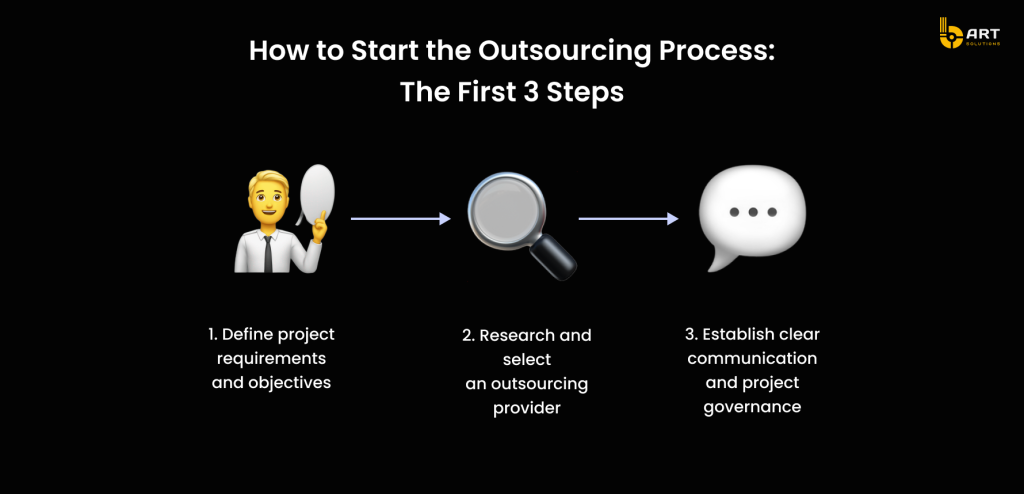
As businesses grow, their technology infrastructure evolves to support increased demand, changing customer behaviors, and expanding product catalogs. Scaling e-commerce software development isn’t just about handling higher traffic; it’s about ensuring a seamless user experience, fast-loading pages, and uninterrupted transactions, even during peak seasons.
An development partner specializing in e-commerce technology scaling should be able to integrate:
- New payment methods, cryptocurrency transactions, or Buy Now, Pay Later (BNPL) options.
- Omnichannel capabilities
- Multi-language & multi-currency support are essential for expanding into international markets.
Zalando, Europe’s leading fashion retailer, expanded into 25+ countries by adopting a scalable microservices approach. Each regional storefront was customized for local preferences without overhauling the entire infrastructure.
Adapting to market changes
A feature that works today might become a legacy tomorrow due to new technology, shifting customer preferences, or regulatory changes. A flexible e-commerce development for growth strategy should:
- Enable quick feature rollouts
- Optimize for new shopping behaviors
- Ensure compliance
bART Solutions always ensures that your custom e-commerce software remains adaptable, and your business stays ahead of competition without frequent, costly platform overhauls.
Communication and collaboration
Clear communication and structured collaboration are the cornerstones of successful e-commerce software development outsourcing. Poor communication is a leading cause of project failures, with 30% of outsourcing setbacks attributed to misalignment. To prevent this, businesses should establish transparent workflows, regular updates, and real-time collaboration tools.
Communication strategies at bART Solutions
Dedicated project managers for streamlined decision-making and progress tracking.
- Regular check-ins keep teams aligned.
- Centralized documentation to maintain requirements and updates.
Collaboration tools
- Jira, Trello – Task tracking and Agile sprint planning.
- Slack, Microsoft Teams – Instant messaging for quick issue resolution.
- Zoom, Google Meet – Video calls for reviews and feedback loops.
- GitHub, GitLab – Version control and code collaboration.
Effective communication leads to faster development, fewer errors, and better project outcomes, ensuring businesses build scalable e-commerce software while staying within budget and timeline.
Budgeting and cost transparency
Budgeting for e-commerce software development outsourcing goes beyond initial development costs. To avoid financial surprises, partners should establish clear pricing models and ensure transparency in project billing. A well-structured budget not only helps control expenses but also maximizes ROI.
Choosing the right pricing model: Fixed vs. hourly rates
- Fixed-price model works best for well-defined projects with a clear scope. It’s ideal for MVP development because costs are agreed upfront, reducing financial risk. But it offers a lot less flexibility, any changes require renegotiation.
- Time & materials model is suitable for scaling e-commerce software development with evolving requirements. It offers a lot of control over priorities, allowing for feature adjustments. On the other hand, it can be hard to estimate final costs without careful monitoring.
E-commerce companies outsourcing to Ukraine
Many international retailers have leveraged Ukrainian e-commerce development expertise to enhance their platforms, optimize performance, and integrate advanced technologies.
Bonprix, a subsidiary of Otto Group, partnered with Ukrainian developers to refine its AI-driven personalization engine, leading to higher cross-selling rates across multiple European markets. By leveraging machine learning and behavioral analytics, the retailer improved product recommendations, boosting customer engagement and conversion rates.
Flaconi, a leading German beauty e-commerce platform, collaborated with Ukrainian engineers to transition to a microservices architecture, enabling faster feature rollouts, improved site reliability, and seamless scalability during peak shopping periods. This structural upgrade allowed Flaconi to handle surges in traffic without performance slowdowns, ensuring a consistent shopping experience for users.
These cases highlight that Ukraine continues to be a go-to destination for high-quality, cost-effective, and technology-forward solutions.
Final thoughts
Outsourcing e-commerce software development goes beyond just a cost-saving strategy, it’s a way to accelerate innovation, enhance customer experiences, and optimize operational efficiency. In a global market worth trillions, businesses that turn to outsourced expertise can implement AI-driven personalization, scalable cloud solutions, and seamless integrations faster and more efficiently than those relying solely on in-house teams or off-the-shelf solutions.
At bART Solutions, we specialize in outsourcing e-commerce app development with a focus on modern architectures, security-first development, and Agile methodologies. Our approach ensures that projects are delivered on time, within budget, and aligned with long-term business goals.
